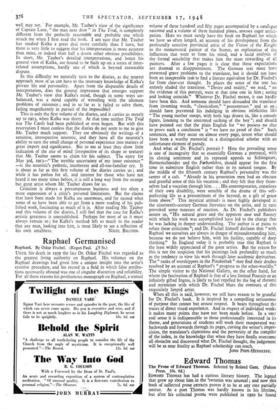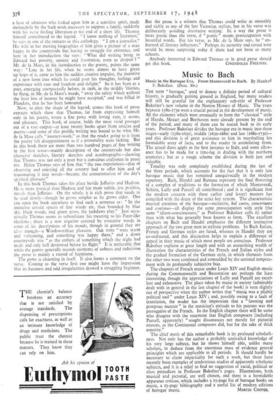Edward Thomas
The Prose of Edward Thomas. Selected by Roland Gant. (Falcon Press. 10s. 6d.)
EDWARD THOMAS has had a curious literary history. The legend that grew up about hint in the 'twenties was unusual ; and now this book of collected prose extracts proves it to be at any rate partially untrue. As a poet Thomas was hardly known in his lifetime, but after his collected poems were published in 19zo he found
a host of admirers who looked upon him as a sensitive spirit, made melancholy by the hack work necessary to support a family, suddenly with his verse finding liberation at the end of a short life. Thomas himself contributed to the legend. "I know nothing of literature," he says in one of the extracts in this anthology. " I am a journalist." His wife in her moving biographies of him gives a picture of a man happy in the countryside but having to struggle for existence, and here in her introduction she says: "What did writing bring to Edward but poverty, anxiety and frustration, even to despair ? " Mr. de la Mare, -in his introduction to the poetry, points the same way : "Late in his life, when he seems almost to have given up hope of it, came to him the sudden creative impulse, the incentive of a new form into which he could pour his thoughts, feelings and experience with ease and freedom and delight." So it has been as a poet, emerging unexpectedly before, in 1916, in the middle 'thirties, he flung, in Mr. de la Mare's words, "away the safety which without the least loss of honour he might have accepted," and was killed in Flanders, that he has been honoured. Now, to alter the shape of the legend, comes this book of prose extracts which show that Thomas, far from expressing himself only in his poetry, wrote a fine prose with loving care, it seems, and pleasure. This book, of course, holds the most vivid passages out of a vast output—at least twenty books apart from articles and poetry—and some of this prolific writing was bound to be what Mr. de la Mate calls "journey-work," so that the reader going to it from the poetry felt disappointment as if a personality were lacking. But in this book there are more than two hundred pages. of fine writing in the best sense—mainly description of the countryside but also character sketches, literary sketches and autobiography—showing that Thomas was not only a poet but a conscious craftsman in prose too. Helen Thomas says of him that "the two experiences—that of observing and enjoying all the country' had to offer him and of transmuting it into words—became the consummation of the day's sp:ritual pleasure."
In this book Thomas takes his place beside Jefferies and Hudson. He is more poetical than Hudson and has more subtle, less positive, moods than Jefferies. On the whole, it is rich prose that needs to be read slowly—though he grows simpler as he grows older. One can open the book anywhere to find such a sentence as: "In the immense crystal spaces of fine windy air, thus bounded by blue sky, black woods, and green grass, the jackdaws play." Just occa- sionally Thcmas seems to subordinate his meaning to his Pater-like rhythms ; there is a non sequitur covered by evocative words in some of his descriptions of his moods, though in general they are c;e ir enough—a Wordsworthian pleasure. Oak trees "were warm and welcoming, and something was happy there," and a dawn countryside was "as the embers of something which the night had made and only half destroyed before its flight." It is noticeable that while the poetry generally records moments of sadness and indecision the prose is mainly a record of happiness.
The prose is charming in itself. It also forms a comment on the verse. Coming to the verse first one might have the impression that its bareness and odd irregularities showed a struggling beginner. But the prose is a witness that Thomas could write as smoothly and richly as any of the late Victorian stylists, but in his verse was deliberately avoiding decorative writing. In a way the prose is more poetic than the verse, if " poetic" means preoccupation with beautiful words. For his verse, as Mr. de la Mare says, he "un- learned all literary influences." Perhaps its austerity and casual tone would be more surprising today if there had not been so many echoers.
Anybody interested in Edward Thomas or in good prose should



































 Previous page
Previous page